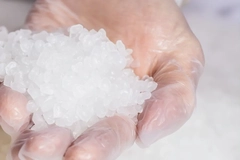Low-emission catalyst for plastic production developed by Chinese scientists
Key takeaways
- Chinese researchers have developed a catalyst that converts syngas into olefins with lower steam use, wastewater generation, and CO2 emissions compared to conventional methanol-based routes.
- The process uses an integrated WGS and STO reaction.
- The breakthrough aligns with industry interest in alternative olefin pathways and supports China’s dual carbon goals.

Chinese scientists have developed a catalyst that converts syngas into olefins, the building blocks for plastics and packaging materials.
The scientists integrate the water-gas shift (WGS) and syngas-to-olefins (STO) reaction in this research. By coupling these two processes, the sodium-modified FeCx@Fe3O4 core-shell catalyst is said to reduce steam consumption, wastewater generation, and CO2 emissions compared with WGS–methanol synthesis–methanol to olefins route.
“Coal, natural gas, biomass, and other non-petroleum fossil energy sources can be used to produce olefins via STO reactions, which is of great significance for optimizing the energy structure,” say the researchers.
Alternative production pathways
The research, published in Science, is led by Chinese teams from the Department of Chemistry at Tsinghua University and the Ordos Laboratory.

The institutions highlight that the research aims to advance China’s dual carbon goals, which are to reach the peak of carbon emissions by 2030 and achieve carbon neutrality by 2060.
“Using lower hydrogen to carbon monoxide ratios implied that reducing steam consumption in the WGS reaction and reducing the overall output of carbon dioxide and wastewater enabled a sustainable STO process for potential industrialization,” share the researchers.
“It provides a sustainable alternative to existing olefin production technologies, offering great potential for the resource-efficient transformation of the olefin industry.”
The plastics industry is increasingly involved in olefins production. This month, Blue Circle Olefins, which is said to be the first to develop a circular methanol-to-olefins production plant in the Netherlands, has secured funding for the next phase of its development.
At K 2025, Vioneo showcased its commercialized green-methanol-to-olefins alternative production pathways to deliver fossil-free virgin plastics. The company’s plant, based in Antwerp, Belgium, is ready to deliver its plastic alternative at scale.












